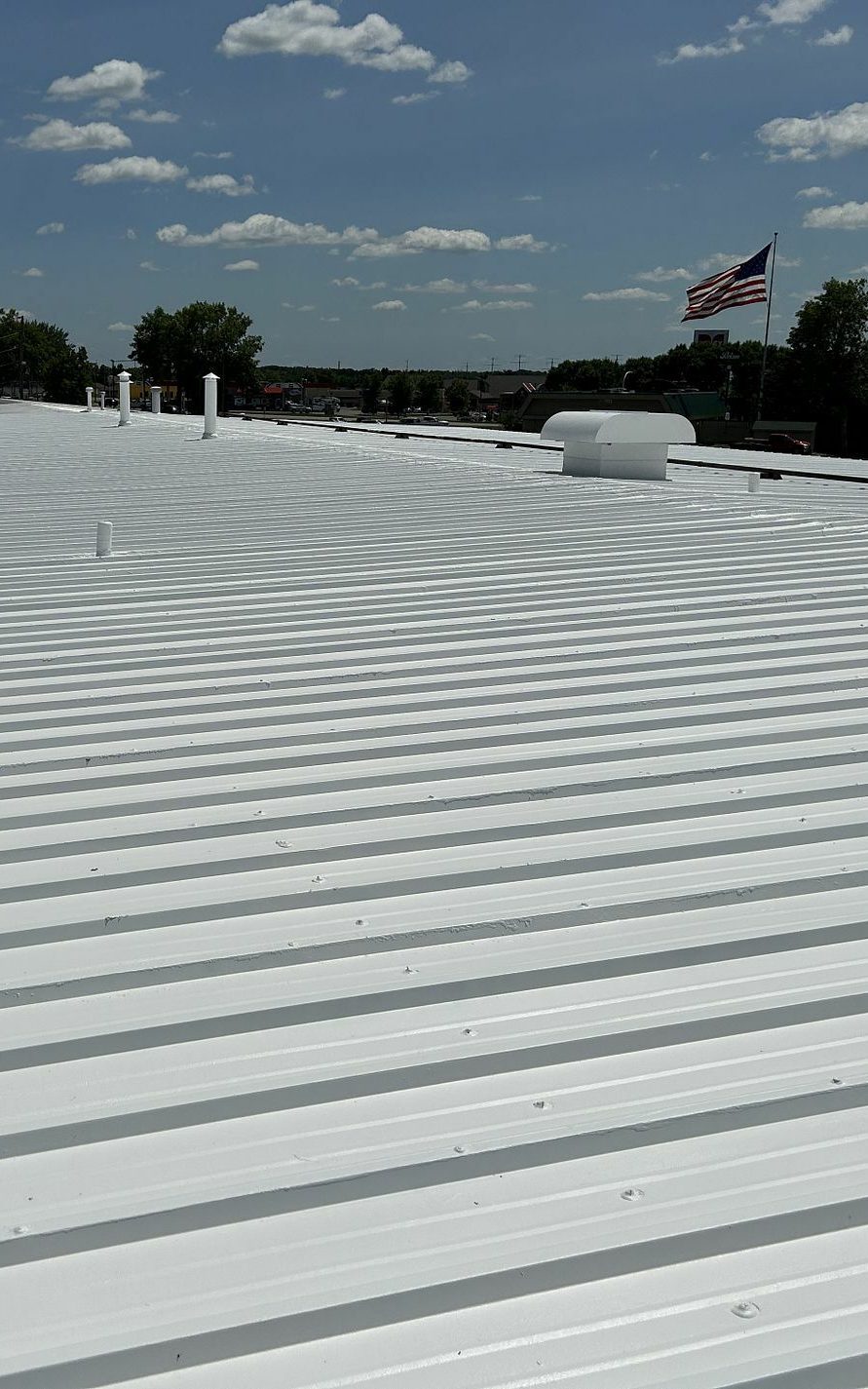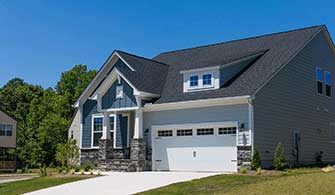Minnesota TPO, EPDM & PVC Commercial Roofing – Flat Roof Systems Built for Performance
TPO, EPDM, and PVC are the three leading types of single-ply commercial roofing systems used on flat and low-slope buildings across Minnesota. Each material is designed for durability, water resistance, and energy efficiency, but they differ significantly in construction and performance. TPO (Thermoplastic Polyolefin) is a reflective white membrane known for its UV resistance and heat-welded seams. EPDM (Ethylene Propylene Diene Monomer) is a black synthetic rubber membrane valued for its flexibility and long-term weather resistance. PVC (Polyvinyl Chloride) is a reinforced thermoplastic membrane with high chemical resistance, exceptional fire ratings, and welded seams that form a watertight bond. All three systems are commonly used on warehouses, schools, restaurants, and medical facilities, and the right choice depends on your building’s use, budget, and environmental exposure.

TPO vs. EPDM vs. PVC: Choosing the Best Commercial Roofing System for Your Property
Choosing the right flat roofing system depends on your building’s needs, environmental conditions, and long-term priorities. TPO is often the top choice for energy-conscious businesses, its highly reflective white surface can reduce cooling costs by up to 30% in the summer, according to the U.S. Department of Energy. EPDM, with its dark color and rubber composition, is ideal for buildings exposed to severe temperature swings or where flexibility is key. It’s known to last up to 30 years when properly maintained. PVC is the best option for facilities requiring chemical resistance or strict fire safety, such as restaurants, industrial buildings, and hospitals. It also features welded seams that are stronger than the membrane itself, offering unmatched waterproofing. At Lakes Country Roofing, we help you evaluate your building type, usage, and budget to choose a system that delivers the best ROI over time.
Step-by-Step Asphalt Shingle Installation by Lakes Country Roofing
Our asphalt shingle installation process at Lakes Country Roofing follows a proven, code-compliant method designed for long-term performance and manufacturer warranty compliance. We begin by removing all old roofing layers during a full tear-off, ensuring the roof deck is exposed and inspected for structural integrity. Next, we install an ice and water shield, followed by a synthetic underlayment for moisture protection. Precision-cut drip edges and flashing are applied at all eaves, valleys, and penetrations. Shingles are then installed using six-nail fastening per manufacturer specs to withstand wind speeds up to 130 mph, with proper staggering for maximum water shedding. Most residential installations are completed within 1 day depending on roof size and complexity.
Benefits of Single-Ply Roofing Systems for Commercial Flat Roofs
Modern single-ply flat roofing systems offer a powerful mix of performance, longevity, and cost-efficiency for commercial properties. TPO and PVC membranes are ENERGY STAR® certified, with solar reflectance indices (SRI) of 78 to 90, reducing rooftop temperatures by up to 60°F on sunny days. This not only lowers cooling loads but also helps HVAC systems last longer. EPDM, while not reflective, excels in long-term flexibility and UV durability, making it ideal for areas with intense freeze-thaw cycles like Minnesota. All three materials are lightweight, minimizing structural load, and are compatible with green roof systems, solar panel arrays, and rooftop equipment. Seam strength, resistance to ponding water, and fast installation make these systems especially appealing for property managers aiming to reduce downtime. When installed by Lakes Country Roofing, your commercial flat roof becomes a resilient, energy-efficient shield built to last decades.
Our Commercial Flat Roofing Installation Process: TPO, EPDM & PVC
At Lakes Country Roofing, every flat roof installation follows a proven process designed to ensure longevity, manufacturer compliance, and energy performance. We begin by removing the old membrane and inspecting the roof decking for moisture or structural damage. Next, we install high-density insulation, often polyiso board with an R-value of up to 6.5 per inch, to meet or exceed local energy codes. Depending on the system, we either fully adhere, mechanically fasten, or ballast the membrane, ensuring secure attachment even in high winds. For TPO and PVC, seams are heat-welded to create a monolithic waterproof barrier, while EPDM seams are sealed with butyl tape and lap adhesives or factory-applied tapes. Our crews follow NRCA and ASTM installation standards, and we perform post-install inspections to validate every weld, edge, and drain. The result: a commercial roof built to perform for 20+ years with minimal maintenance.
Lifespan & Maintenance Needs of TPO, EPDM & PVC Roofs
The average lifespan of a commercial flat roof depends on the membrane type, installation quality, and maintenance schedule. TPO roofs typically last 15-25 years, with newer formulations showing improved UV resistance. EPDM roofs are known for their long-term flexibility and can last up to 30 years with annual maintenance. PVC systems, thanks to their reinforced scrim and chemical durability, also offer 20-30 years of reliable protection. Regardless of material, we recommend a semi-annual inspection, especially after storms or heavy snowfall, to detect seam separation, flashing wear, or ponding water. Lakes Country Roofing offers customizable maintenance programs that include drain clearing, seam inspections, membrane cleaning, and minor repairs, extending your roof’s lifespan while protecting your investment. Routine care costs far less than emergency repairs, and most manufacturer warranties require periodic inspections to remain valid.
Why Minnesota Facility Managers Choose Lakes Country Roofing
From Brainerd to Fergus Falls, Lakes Country Roofing is the go-to commercial roofer for Minnesota businesses that demand quality, accountability, and local expertise. With over 15 years of flat roofing experience, we’ve installed and maintained TPO, EPDM, and PVC systems on schools, restaurants, office complexes, medical centers, and warehouses across the region. Our teams are trained in manufacturer-certified methods, and we stay current with energy code changes, ASTM standards, and the unique demands of the Midwest’s harsh freeze-thaw cycles. Property managers trust us because we’re responsive, fully insured, and never cut corners – from insulation prep to final weld. Whether your roof is 10,000 or 100,000 square feet, we treat every project with the same precision and integrity. We, at Lakes Country Roofing, also provide long-term maintenance support to protect your investment beyond installation.
Request a TPO, EPDM, or PVC Roofing Quote for Your Minnesota Business
Whether you’re planning a new flat roof installation or replacing an aging system, Lakes Country Roofing makes it easy to get expert help. Our commercial roofing specialists provide on-site evaluations, detailed estimates, and tailored material recommendations based on your building type and budget. We’ll walk your roof, identify vulnerabilities, and help you compare TPO, EPDM, and PVC in terms of lifespan, warranty, and total cost of ownership. Our quotes are fast, honest, and backed by a workmanship warranty. To get started, call (218) 997‑7663 or fill out our commercial roof estimate form to book your free consultation. Protect your business with a roof that’s built to perform and priced to deliver value.
Commercial Flat Roof FAQs: TPO, EPDM & PVC Roofing Systems
How Are TPO, EPDM, and PVC Commercial Roofs Different?
TPO and PVC are both thermoplastic membranes with heat-welded seams, but PVC offers higher chemical and fire resistance. EPDM is a rubber membrane with exceptional flexibility and UV durability. TPO is often the most cost-effective and reflective option.
Which Commercial Flat Roofing System Has the Longest Lifespan?
EPDM and PVC roofs typically last 20-30 years, while TPO ranges from 15 to 25 years depending on thickness and UV exposure. Regular maintenance can significantly extend lifespan.
What’s the Best Commercial Roofing Membrane for Minnesota Winters?
EPDM performs well in freeze-thaw conditions due to its elasticity. However, TPO and PVC, when properly installed with reinforced seams and insulation, are also durable choices in cold regions.
Do TPO, EPDM, and PVC Roofs Improve Energy Efficiency?
Yes. TPO and PVC have solar reflectance ratings as high as 0.85, qualifying for ENERGY STAR® status. EPDM is not reflective but insulates well with the right substrate and insulation.
What’s the Average Cost per Square Foot for TPO, EPDM, and PVC Roofing?
Costs vary by membrane type, roof size, and prep work. On average:
- TPO: $5.50-$9.00/sq. ft.
- EPDM: $5.00-$8.50/sq. ft.
- PVC: $6.50-$10.00/sq. ft.
Request a detailed quote from Lakes Country Roofing for an accurate number.
Are TPO, EPDM, and PVC Roofs Compatible with Rooftop Equipment?
Yes. All three systems support rooftop equipment, but proper weight distribution, flashings, and support membranes are essential. Our team designs around your mechanical needs.










